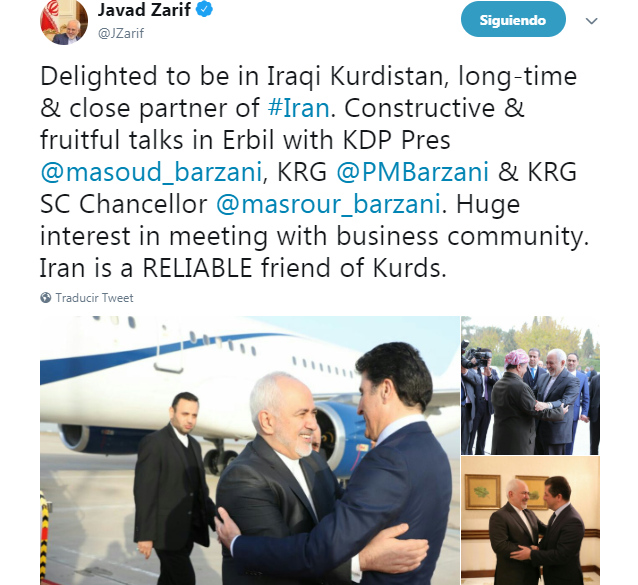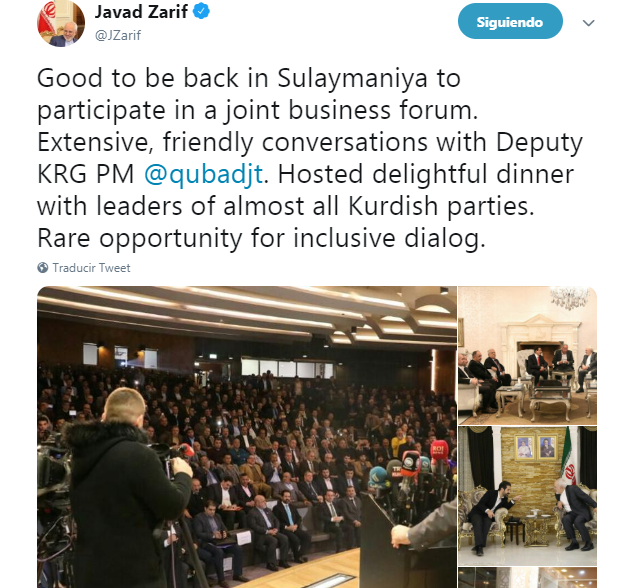Iran and Iraqi Kurdistan region have agreed to build joint industrial regions in a bid to manufacture products and export them to other regional countries.
“We have agreed with our brothers in the Kurdistan Regional Government (KRG) to build joint industrial parks in our border areas in a bid to produce in cooperation with the Kurds and export the products,” Iranian Foreign Minister Mohammad Javad Zarif told a a joint Iran-Iraqi Kurd business forum in Erbil on Tuesday. He was accompanied by KRG Prime Minister, Nechirvan Barzani.
“Using the possibilities and capabilities of the Kurdistan Regional Government, we can export our joint products to other countries, especially Arab countries,” added the Iranian foreign minister on the third day of his five-day working visit to Iraq.
Currently, Iran’s main problem in further developing economic ties with regional countries are unilateral US sanctions and lack of financial channels based on each country’s national currency.
Reliable friend of Kurds
Zarif said Tehran and Erbil are in talks to find some solutions to financial difficulties. He said the sanctions can’t harm trade relations between Iran and Iraqi Kurdistan region, reiterating that his country is a reliable friend of Kurds.

A screenshot of Iran FM tweet showing him holding talks with Iraqi Kurd officials in Erbil
“You can always count on our good faith because the Islamic Republic of Iran has also seen good faith from Kurdistan Regional Government,” stressed the Iranian policy chief while addressing the joint business forum in the Iraqi Kurd capital.
Iran has always thrown his political support behind the Kurds during the eight-year US invasion and helped them repel the so-called Islamic State terrorists from their territories. The KRG PM Barzani appreciated the Iranian backing, saying “Iran has always been our friend in hard days.”
He added that Iranian firms that have been helping build vital infrastructure in the region, haven’t been able to be paid over th epast 4 years. But, he promised that “hard days are over” and that his government will do whatever he can to resolve the situation. "I thank all the Iranian investors and contractors that have been with us during the past four years and went through hard days," said Barzani.
Dara Jalil Khayyat, head of the Kurdistan Union of Chambers of Commerce and Industry, also urged the Iranian businessmen to invest in joint production and export. “I invite all our Iranian brothers and investors to take up strategic partnership with their KRG brothers to manufacture products and export them to other countries,” he told the forum before Zarif made the same remarks.
For his part, deputy Iran Chamber of Commerce, Industries, Mines and Agriculture (ICCIMA) in international affairs, reiterated that Iran’s foreign policy has been “establishing ties with Islamic neighbouring countries,” saying that Iraq is high on Tehran’s agenda.
He also urged the Iraqi Kurd authorities to accelerate clearance of outstanding payments to the Iranian construction firms that have been building infrastructure in the region.
The Iranian Foreign Minister also flew to Sulaymaniyah in a bid to take part in another joint business forum that aims to consolidate more than ever the friendly relationships between Tehran and the Iraqi Kurdistan region.

A screenshot of Iran FM Zarif's tweet showing him attending Iran-Iraqi Kurd joint business forum in Sulaymaniyah
Iran’s Kurdistan Province shares 230 kilometers of border with Iraq’s autonomous Kurdistan region with one active official border crossing called Bashmagh. There are also three active joint border markets between the two regions.
Zarif later headed to the Iraqi city of Najaf and flew to Karabala. He is due to take part in another business forum between Iranian and Iraqi tradesmen. His tour of Iran's Arab neighbour comes after a flash visit by US Secretary of State, Mike Pompeo, that is pushing Iran neighbours and its oil and gas clients to cut their trade with Tehran. Iraq has been granted a sanctions waiver to keep buying Iranain oil and gas to keep producing energy for its nearly 40 million citizens.